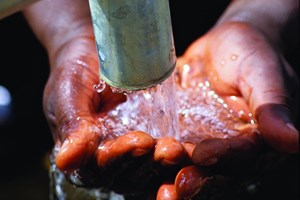West Virginia town unable to use tap water for four weeks after groundwater pollution
CHARLESTON, W.Va. (AP) — A notice ordering residents of a northern West Virginia community not to use their tap water entered its fourth week Wednesday after a treatment-plant malfunction allowed the release of a hazardous solvent into the community’s groundwater.

Dr. Matt Christiansen, the state’s health officer, said preliminary findings from the U.S. Environmental Protection Agency showed tetrachloroethylene in the water serving the community of Paden City along the Ohio River.
Tetrachloroethylene is a harmful chemical widely used by dry cleaners. Paden City officials have said a dry cleaner in the town of about 2,500 residents closed early this century.
The city issued the “do not use” order on Aug. 16 after a pump valve malfunctioned at a water treatment plant. City officials said the issue was fixed then while testing on the water continued.
Christiansen said the order will remain in effect “until there’s no doubt in our minds that the chemical has been fully flushed from the system. In the meantime, we understand everyone’s frustration at the local level and concern with the situation. But our goal remains getting that water back on and doing it safely.”
Last year, the EPA added Paden City’s groundwater to a national Superfund cleanup priority list. Sites are added to the list when contamination poses significant human health and environmental risks. They are then eligible to receive federal funding for long-term cleanup projects.
At the time, untreated groundwater collected in Paden City was discovered to contain tetrachloroethylene at levels higher than the federally allowed limit, the EPA said. The agency says tetrachloroethylene is a likely carcinogen and can harm an individual’s nervous system, liver, kidneys and reproductive system.
Tetrachloroethylene had been detected in Paden City’s water system since around 2010 at levels below maximum allowable standards The city was assessed a violation notice in December 2018 after the levels exceeded the federally allowed limit.
“This is an EPA Superfund site, and they’re the lead agency,” Gov. Jim Justice said Wednesday. “Sometimes federal agencies move a lot slower than what we want to move.”
Related News
From Archive

- DeLa Express seeks FERC approval for Permian-to-Louisiana gas pipeline project
- Hudson Tunnel Project set to generate 95,000 jobs during construction phase, report says
- Charleston Water System settles huge lawsuit over sewer system damage caused by non-flushable wipes
- Boring machine 'Chessie' resumes drilling at Chesapeake Bay Bridge-Tunnel site after anchor incident
- Aegion continues western expansion with acquisition of underground utilities company Toncco
- Ditch Witch 1030
- 24th Annual Directional Drilling Survey
- Michigan lawmakers introduce bills to create septic codes throughout the state
- House passes Rep. Duarte's legislation to streamline water permitting processes in the Valley
- Court approves 3M settlement over ‘forever chemicals’ in public drinking water systems



Comments